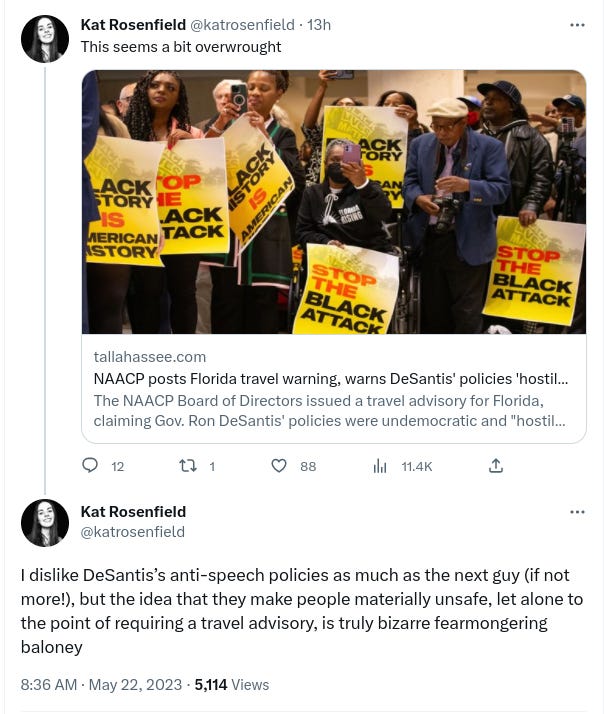E-Pluribus | May 23, 2023
Cancel culture and collective guilt; classical appropriation; and reflections on faith, identity and journalism.
A round-up of the latest and best writing and musings on the rise of illiberalism in the public discourse:
Yascha Mounk: Collective Guilt is the Most Indefensible Form of Cancel Culture
Although individualism has been part of the fabric of America since its founding, group identity has not always been considered a negative, often giving a sense of belonging and community. But group identity also has its downsides, and Yascha Mounk writes at Persuasion about a particularly insidious and potentially dangerous side effect of group identity: collective guilt.
[There is] a simple yet important principle which liberal nations like the United States must never abandon: a person’s moral standing is not defined by their nationality. There can be no collective guilt by virtue of wrongful birth. When your nation does something evil, you may have a moral obligation to speak up; if you do, it is absurd to hold you responsible for the actions of people whom you oppose and abhor.
Sadly, this is a principle in which even organizations that are sworn to uphold liberal values appear to need a remedial lesson. Last weekend, PEN America—which is dedicated to defending and promoting free expression around the globe—canceled a panel in which dissident writers, including Russian journalists who have long been deeply critical of Putin’s regime, were going to present their work.
[ . . . ]
Two things make this episode especially notable in my mind, for both show how deeply the decline of liberal principles and the fear of moral contamination have now penetrated the mainstream. The first is that an organization of writers found itself unable to uphold the distinction between a person and the nation from which they hail. Who will defend the primacy of the individual and their conscience over the call of ascriptive identity and collective guilt if an organization of writers—who should be the first to recognize humanity in all of its glorious complexity—is unable to do so?
The second is that the people who made this decision are hardly members of the illiberal left (or, for that matter, the illiberal right). Suzanne Nossel, the organization’s CEO, has a principled commitment to free speech. Ayad Akhtar, the president of PEN and a wonderfully nuanced novelist, even had the courage to subtly push back against left-wing forms of cancel culture at the organization’s gala last year. I know and respect both, and I can only begin to imagine what kind of cross-pressure they must have been under for the past few days. But principles only matter if we are able to honor them when living up to them is difficult—and if even people as thoughtful and principled as Nossel and Akhtar are unable to resist the siren call of such an evidently unjust cancellation, then the culture as a whole is in deep trouble.
Read the whole thing.
Heather Mac Donald: Bastardizing Beethoven
“Roll over Beethoven” Chuck Berry famously chided the legendary composer in his hit 1950s song, but more recent developments might have the classical giant spinning in his grave at record speed. Heather Mac Donald writes at Quillette about the (apparently) acceptable form of cultural appropriation being applied to the works of Beethoven and other composers these days in the name of social justice.
In the Met’s Fidelio, a BLM activist (the updated husband from Beethoven’s Fidelio) had been writing a doctoral dissertation on the 13th Amendment, and investigating corrupt “fascists” in the criminal-justice system. In retaliation, racist cops shoot him, and a racist warden of a super-maximum prison throws him into solitary confinement. The activist’s wife, unable to persuade any lawyers to take up her husband’s case pro bono, goes undercover as a female correctional officer in her husband’s prison. This change from a male to a female disguise allows for a pleasingly homoerotic revision to the plot. In the original opera, a prison guard’s daughter falls in love with the new “male” employee, echoing Lady Olivia’s fruitless infatuation for the disguised Viola in Shakespeare’s Twelfth Night. In the Met Museum’s Fidelio, the prison guard’s daughter is a lesbian; her black father encourages his daughter to court the new black female assistant.
In the current political and artistic environment, Fidelio was a Black Lives Matter manifesto waiting to happen. What made the Met Museum’s production noteworthy was that the revision did not occur exclusively through the staging; Heartbeat Opera rewrote the spoken dialogue as well. (That dialogue was delivered in English, while the arias and ensembles remained in their original German.) The activist’s wife complains that the “real conspiracy” was not the one for which her husband was detained, but rather the “suppression of immigrants and people of color” in the United States. The super-maximum prison contains people “whose only mistake was being poor and black.”
[ . . . ]
The only reason the Metropolitan Museum of Art mounted Fidelio was the Black Lives Matter gloss. Without it, the museum’s leadership would have had no interest in the work. The production provided the museum with a racial-justice twofer, however, since opening night featured a post-performance discussion between five “social justice advocates” on how to dismantle “current systems of incarceration through the abolitionist movement.” The Eric H. Holder Jr. Initiative for Civil and Political Rights at Columbia University sponsored the discussion. Such a panel may have once seemed tangential to the mission of an art museum; in the post–George Floyd era, such racial-justice advocacy has become central to curating and programming.
Read it all.
Chris Stirewalt: Tim Keller’s Quiet Revival and My Place Between Two Worlds
The latest from political analyst and writer Chris Stirewalt at The Dispatch, reflecting on the public life and recent death of pastor Tim Keller, touches on the role of faith in the life and work of a journalist (which, on a personal note, I also wrestle with on a regular basis, as I alluded to in the final paragraph of my introductory essay upon Pluribus’ launch). In the present political and journalistic climate where identity is often everything, Stirewalt relates how he strives for balance between his two worlds while also providing his readers with the accurate and fair presentation of facts and analysis they expect and deserve.
I do not think of myself as a Christian journalist. I want to be a journalist who is a Christian.
[ . . . ]
There isn’t anything I’m doing that couldn’t be done as well or better by a person of a different faith or of no faith at all. I want the best parts of who I am—a Christian, a father of beloved sons, a partner to an amazing woman, a brother, a friend, an American—to inform and guide my work. But that work has to stand on its own. I can’t wrap myself in those things and ask you to read these words through that filter. Indeed, my job requires that I recognize how who I am, for good and for ill, affects my own perceptions, and then do my best to control them.
And if what I worship and adore is really worthy, then those things will encourage this kind of honesty and mercy.
A journalist, especially in a free, pluralistic nation, owes his or her audience the best effort to portray the world as it is. That means developing the capacity to look at things through the eyes of others and eschewing feelings of superiority and contempt, faults which strong beliefs often encourage. But being a Christian demands that I seek to be humble; and there is no humility in imagining that there is only one way to look at anything. My analysis must start with the understanding that I might be wrong and then proceed with care.
So today, as a journalist who is a Christian, I have to look at my strong disdain for the voguish identity–based coverage that so often occludes reality and insight in the name of, heaven help me, authenticity. How does my desire to keep my identity out of the story limit the stories I am willing to tell? That’s certainly true for the ones that relate to my faith, which is a problem when Christianity and politics collide as they do now, to the detriment of both.
Read it all here.
Around Twitter
If the NAACP is going to post travel warnings for black Americans, perhaps Washington DC would be more appropriate.
Via Shadi Hamid and Matthew Petti, a look at culture war in an Islamic context:
And finally, via Wesley Yang, an argument for elective amputation in . . . the British Medical Journal?











